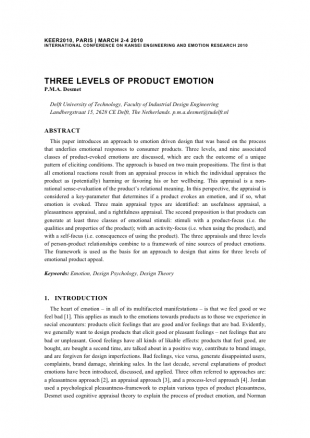This paper introduces an approach to emotion driven design that was based on the process that underlies emotional responses to consumer products. Three levels, and nine associated classes of product-evoked emotions are discussed, which are each the outcome of a unique pattern of eliciting conditions. The approach is based on two main propositions. The first is that all emotional reactions result from an appraisal process in which the individual appraises the product as (potentially) harming or favoring his or her wellbeing. This appraisal is a nonrational sense-evaluation of the product’s relational meaning. In this perspective, the appraisal is considered a key-parameter that determines if a product evokes an emotion, and if so, what emotion is evoked. Three main appraisal types are identified: an usefulness appraisal, a pleasantness appraisal, and a rightfulness appraisal. The second proposition is that products can generate at least three classes of emotional stimuli: stimuli with a product-focus (i.e. the qualities and properties of the product); with an activity-focus (i.e. when using the product), and with a self-focus (i.e. consequences of using the product). The three appraisals and three levels of person-product relationships combine to a framework of nine sources of product emotions. The framework is used as the basis for an approach to design that aims for three levels of emotional product appeal.
Citation
Desmet, P. (2010). Three levels of product emotion. Paper presented at the Proceedings of the International Conference on Kansei Engineering and Emotion Research.




